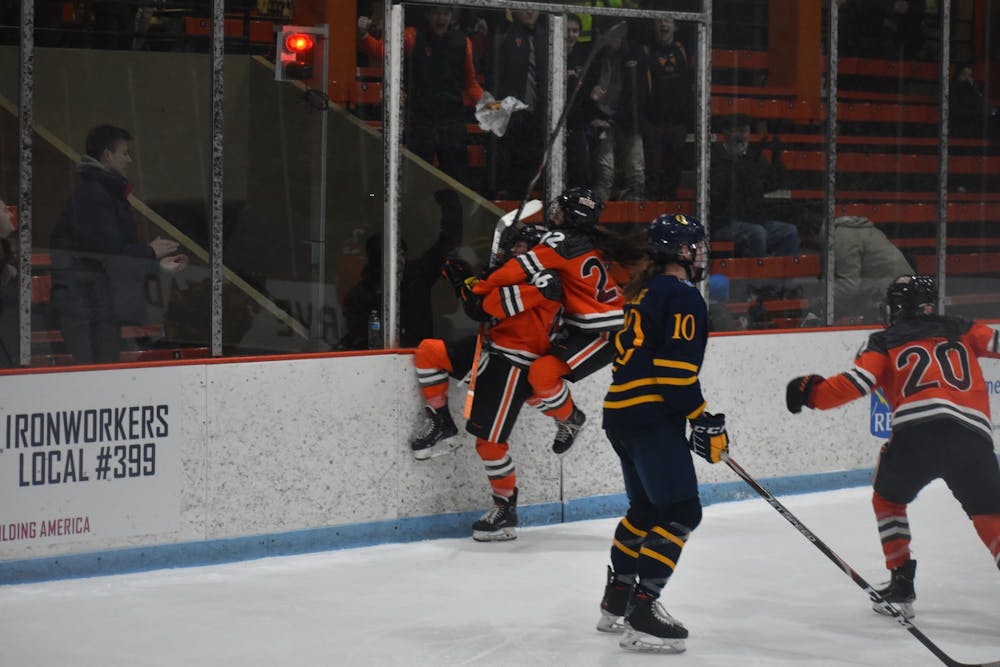Three Tigers rushed down the ice, with one defender looking to stymie the rush. Princeton executed a pass, fired a shot on net, and forced the rebound in the back of the net.
In a flash, the game, and the series, was over: a mob of orange and black stormed the ice with the knowledge that they would be playing next weekend.
The three-game ECAC Quarterfinal series against Quinnipiac lived up to expectations. Between two teams with plenty to prove, there were tons of big hits, highlight-reel saves, and an atmosphere that felt more like a street fight than a hockey game. If you didn’t know these teams didn’t like each other before the series, you certainly did afterward.
Entering as the No. 2 seed, the Tigers came out looking like they would make quick work of the Bobcats. Just 22 seconds into the game, sophomore forward Sarah Fillier found senior defender Claire Thompson in front of the net, and Thomspon buried the puck to give Princeton the early momentum. Moments later, senior forward Carly Bullock scored again, giving the Tigers a 2–0 lead before most were even in their seats. Another consecutive two-goal onslaught within the first period — this time brought by freshman forward Annie Kuehl and sophomore forward Maggie Connors — doubled the Tigers’ lead to 4–0 and essentially ended the game before it even began.
Credit, however, must be given to Quinnipiac senior goalie Abbie Ives; despite being overwhelmed to start game one, she weathered the storm of Princeton pressure and blocked out the rabid Princeton fanbase to keep the Bobcats in the series.
The Bobcat turnaround started later in the first period — while the Tigers were entirely uninhibited in the first ten minutes of the series, the next 200 would prove to be much more difficult. Throughout the remainder of the first game and all of the second, Quinnipiac would force Princeton into many odd-man offensive opportunities, frequently making the Tigers turn the puck over before they could sustain any sort of pressure. Meanwhile, the Bobcats did the opposite, holding possession for extended periods of time and forcing the Tigers to tire on defense.
The strategy worked for most of the second game. After Bullock scored in the waning minutes of the first period, the Tigers had few scoring chances for the rest of the game. The Bobcats, on the other hand, capitalized on the few rebounds that senior goalie Stephanie Neatby gave up in the game, taking a 2–1 lead into the final minutes of the game. With the Bobcats trying to win in regulation, Bullock had other plans, scoring her second goal of the game after video review determined her deflection was not a kick. Riding their momentum into overtime, Princeton could not close the deal — Quinnipiac scored the game-winning goal off a faceoff, one of their few wins in the circle the entire series.
So the series came down to Sunday: a “do or die” game three to advance to the semifinals. The game was ugly and physical — the teams at one point had a combined 11 power play opportunities. With an even thinner defensive line, the pressure was on junior goalie Rachel McQuigge — making her first start of the series — to hold off the increasing Bobcat offense. For the first 55 minutes of the game, she was unstoppable, as the Tigers built a 2–0 lead. When Thompson fired a snipe from just inside the blue line that found its home, and many in the stands felt this was the turning point.
Quinnipiac however, had other plans. With their season on the line, the Bobcats rallied, putting together their best five-minute stretch of the series to tie things up before the regulation horn sounded. For the second straight game, there would be overtime. Thanks to Neatby’s work in the first few games, the Tigers had fresher legs in net. While the Bobcats dominated the first half of overtime one, it was the Tigers who generated scoring chances and looked as if they were on the verge of winning. Ives continued to hold the line, making save after save, knowing that the next goal she let in would mean the end of her career. It would take until midway through the second overtime for Princeton to finally break through. The game officially became the second-longest in Princeton history, trailing only the triple overtime contest against Quinnipiac in 2017.
The win for Princeton was huge: by defeating the No. 10 Bobcats, the Tigers added to their NCAA Tournament resume, making their chances of playing in the national contest much more likely. For now, though, they have an opportunity to defeat the team that has ended their ECAC tournament runs more than anyone else: No. 5 Clarkson. The Tigers are winless in seven semifinal games, with their last three defeats coming from the Golden Knights. Should the Tigers win that, they would face the winner of No. 1 Cornell and No. 10 Harvard.









